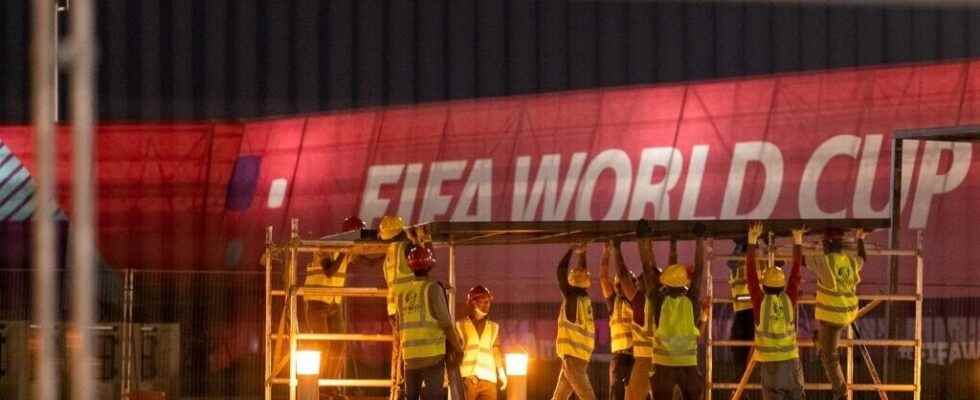Qatar is once again under fire for the fate reserved for foreign workers employed on the construction sites of World Cup stadiums. In a report published Thursday, the British NGO Equidem denounces a system of “ discrimination and exploitation which she says persists despite Qatar’s labor law reforms. The NGO relies on the testimonies of around sixty migrants, mainly Nepalese, Indians and Kenyans.
Dennis at 38. In 2020, he decided to go to work in Qatar in the hope of finding a better salary there than in Kenya. A recruitment agency promises him a contract as a security officer in a reputable hotel in Doha. But as soon as you arrive in Qatar, you are disillusioned: ” They picked me up at the airport to drive me to where I was supposed to work. And I found myself in a construction company carrying bricks, like a mason’s helper. It’s not at all what I expected. But I had no choice, I had to work. »
And even less choice than in Kenya, Dennis went into debt to pay his recruitment agency 1,300 dollars for a contract of which no clause will be respected: neither the function, nor the salary which will ultimately be 30% of less than advertised for a hectic pace of work.
” We were supposed to work 8 hours a day, but in fact it was more like 13 or 14 hours with 10 minutes break, time to swallow food and drink. And you go back to work. Today, I still have pain. You know, staying so long, not sitting down, carrying heavy things. Some days I had to assist two masons instead of one and the supervisor would tell us: ‘you have to work hard because the stadium has to be finished in 2022 for the World Cup. And if we demanded payment for overtime, they threatened to fire us’ “.
►Also listen: World Cup 2022 in Qatar: the hidden face of modern slavery
Workers treated like slaves
After leaving Qatar, Dennis is still very marked, physically and morally, it is with a broken voice that he recounts the humiliations suffered on the site. ” Sometimes they called us monkeys. It was really hurtful. They said to us:You black monkey, work faster. Do this, do that“. It was terrible. It was a tragedy for us. »
In his report, theNGO Equidem denounces ” practices that amount to forced labor » Were Dennis and his colleagues free to move around outside of work? There was no formal ban, but what Dennis describes and other workers in this report is a climate of fear and surveillance even in the isolated dormitory town, where Dennis was driven by his employer on leaving the site. “ After work, you are not free to move around as you wish. They don’t like it. We did not feel free. But rather confined “.
►Also read: Qatar: the suffering of foreign workers, forgotten builders of the 2022 World Cup
Some reforms not applied
However, Qatar has carried out reforms to improve labor legislation. Equidem talks about it in its report. Qatar has notably imposed a minimum wage and largely abolished the sponsorship system which prevented employees from leaving the country or changing jobs without the employer’s authorization, but the application of these laws remains uncertain according to the NGO and insufficient remedies.
Geoffrey Owino, a former migrant worker in Qatar, has been arrested several times for trying to enforce these texts. He works for the NGO Equidem in Kenya today. ” Some employers are untouchable. They do the opposite of what is written in the law and nothing happens to them. I’ll give you an example of what happens. You go to file a complaint with the Ministry of Labor because your rights have been violated, but your employer rushes to the Ministry of the Interior, ie the police and reports you as a fugitive. Well, you’ll be expelled before you’ve even been heard. The government itself is torn. And it’s to the detriment of the workers “.
In a press release, the organizing committee of the Mondial refutes these accusations and denounces a report “ full of inaccuracies and misrepresentations “. More nuanced, FIFA indicates in a separate press release “ liaise with (his) Qatari counterparts to assess the information contained in the report “.
►Also read: Qatar: a Vinci subsidiary soon to be indicted for “trafficking in human beings” and “forced labor”?
